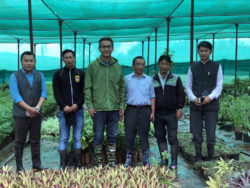
Dharamsala – A high-level technical team comprised of Kaydor Aukatsang, Chief Resilience Officer and SARD Director, and Tsewang Gyalpo Arya, Additional Secretary at the Department of Home, visited Hunsur Rabgyaling and Byllakupe Settlements from July 22-August 2, 2018. The visit was organized by the Department of Home as part of its Integrated Settlement Development Programme (ISDP) funded by USAID. The visit was staffed by Tenzin Chemi from Nangsi.
The primary purpose of the visit was to assess the technical and financial feasibility of the projects that made it to the final round of funding consideration under ISDP. The technical team met with all the community members who submitted the project and visited the project sites. Upon conclusion of the meetings, the team sat down with the Settlement Officer, Community Mobilizers and members of the Local Development Committee (LDC) in each of the three settlements of Hunsur Rabgayling, Dicky Larsoe and Lugsam and collectively came up with a smaller list of projects for consideration by the Department of Home and final submission and approval by the funder (USAID).
The technical team reviewed a total of five projects in Hunsur, 13 in Delar and 22 in Lugsam. The primary lens through which the projects were reviewed was that the project benefited as many settlement residents as possible and that the basic premise and assumptions underlying the project was sound, feasible and sustainable. There were several projects related to dairy farming, agroforestry, and small and medium enterprises. The Settlement Officers, Community Mobilizers and LDC members will have a big responsibility in drafting the proposals for the final list of projects selected by Nangsi and SARD. The proposals will include clear objectives, description of activities, timeline, management plan, etc.
ISDP is a strategic initiative under the USAID-funded Tibetan Self-Reliance and Resilience (TSRR) Programme. It seeks to directly involve the settlement residents in the identification and selection of development projects. The thinking is that community participation and ownership of the process will lead to more sustainable projects. The ISDP process involves a Participatory Needs Assessment (PNA) which has to date been conducted in 14 settlements in India and Nepal.
The technical team also visited the Organic Research and Training Center (ORTC), Tsojhe and Sera Mey and Sera Je hospitals, the elderly home in Lugsam, Karuna Home, Tashilhunpo Library (under construction), and the housing project for Newly Arrived Tibetans in Lugsam.
The team’s other program included: a visit to the Institute for Small Trade Learning (ISTL) in Neelamangalam; meeting the students taking ISTL hotel management classes in Bangalore; speaking to the students at the Dalai Lama Institute for Higher Education; meeting with the leadership of the Federation of Tibetan Cooperatives in India, Ltd and Presidents and Secretaries of the five southern Tibetan cooperatives; meeting with the Chief Representative of Southern Tibetan Settlements; and a tour of the Tibetan Youth Hostel in Bangalore.
